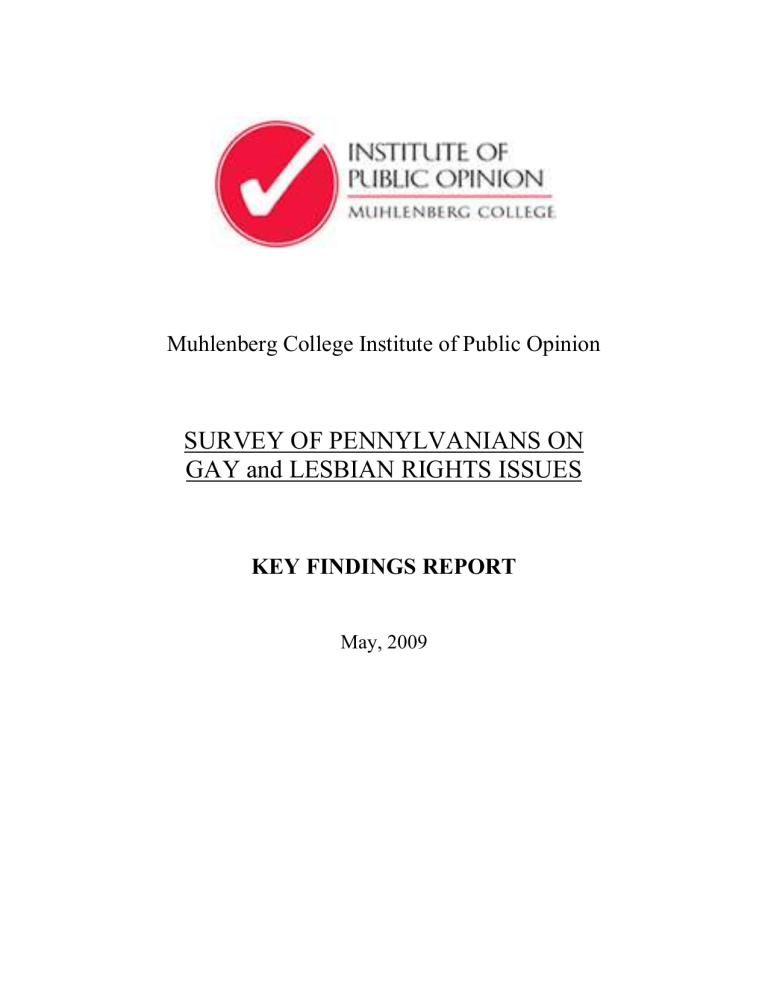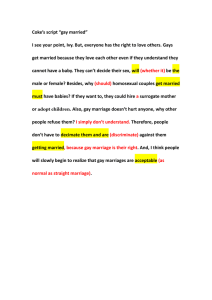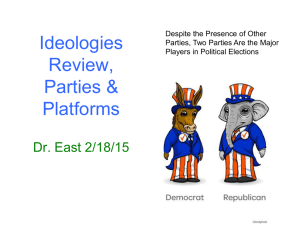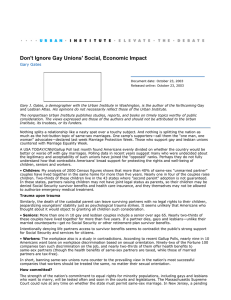SURVEY OF PENNYLVANIANS ON GAY and LESBIAN RIGHTS ISSUES

Muhlenberg College Institute of Public Opinion
SURVEY OF PENNYLVANIANS ON
GAY and LESBIAN RIGHTS ISSUES
KEY FINDINGS REPORT
May, 2009
KEY FINDINGS
1.
While a majority of Pennsylvanians oppose the recognition of same-sex marriage, there has been an increase in the percentage of state residents who support the recognition of marriages by gay and lesbian individuals.
2.
Commonwealth residents are very divided in terms of support for a Constitutional amendment banning same sex marriage.
3.
A substantial majority of Keystone State residents support a policy that allows same-sex couples to form civil unions.
4.
Pennsylvanians are split on the “Don’t Ask Don’t Tell” policy regarding gay and lesbian individuals serving in the United States military.
5.
Most individuals in the Commonwealth indicate that a candidate’s position on gay marriage does not affect their vote.
METHODOLOGY: The following key findings report summarizes data collected in a telephone survey of Pennsylvania residents between March 9- March 31, 2009. Individual households throughout Pennsylvania were selected randomly for inclusion in the study. The sample of phone numbers used in the survey was generated by Genesys Sampling Systems of Ft.
Washington, PA. Interviewing was conducted by the staff of the Muhlenberg College Institute of Public Opinion, with 446 surveys completed. This number of completions results in a margin of error of +/- 5% at the 95% confidence interval. However the margin of errors for sub groups
(i.e. women, income groups, party affiliation) is larger due to smaller sample size. Percentages throughout the survey have been rounded upward at the .5 mark, thus many totals in the results will not equal 100%. Due to a higher number of completions from the Lehigh Valley region the data was weighted to more accurately represent the distribution of voters throughout the commonwealth. The survey questionnaire was designed by Adrian Shanker, Intern at the
Muhlenberg College Institute of Public Opinion in consultation with staff members of the
Morning Call. A nalysis and report writing were completed by Dr. Christopher Borick, Director,
Elisa Zaehringer, Assistant Director and Adrian Shanker, Research Assistant.
OVERVIEW: The issue of gay marriage has received increased public attention with recent actions in Iowa and Vermont. In early April the Iowa Supreme Court unanimously ruled that a state law restricting marriage to a man and a woman was unconstitutional, and the Vermont
Senate overrode the governor’s veto to legalize gay marriage in that state. Most recently the State of Maine passed legislation legalizing gay marriage, with New Hampshire poised to follow with similar actions. Against this backdrop the Morning Call and Muhlenberg College’s Institute of
Public Opinion release the findings of our latest survey of Pennsylvanians on this matter. The
1
results of the survey indicate that Pennsylvanians remain highly divided on gay rights issues, including gay marriage and the military’s “Don’t Ask Don’t Tell” policy, but have become increasingly supportive of allowing gay and lesbian couples to form civil unions.
Public Support for Gay Marriage and Civil Unions:
The survey results provide evidence that a majority (51%) of Pennsylvanians oppose allowing same sex couple to marry, but there has been an increase in the percentage of
Commonwealth residents who support legalizing gay and lesbian individuals to marry.
Support for full marriage rights for Pennsylvania’s same-sex couples increased from 35% in
2004 to 42% in 2009, while opposition to this policy decreased from 54% to 41%.
Table One
Pennsylvania Support for Gay Marriage
Gay Marriage should
2004
35%
2009
42% be Recognized
Gay Marriage should not be Recognized
54% 51%
Not Sure/Refused 12% 7%
While most Pennsylvanians do not support the legalization of gay marriage, a substantial majority of Keystone State Residents support allowing same-sex couples to form civil unions. Keeping in line with national trends in support of relationship recognition for samesex couples, 61% of Pennsylvania voters in 2009 support creating civil unions for
Pennsylvania’s same-sex couples to extend the rights and benefits the state provides to married heterosexual couples to same-sex couples. This is an increase from 2004, when 54% supported the Commonwealth granting civil unions.
Table Two
Pennsylvania Support for Civil Unions
Favor Civil Unions
2004
54%
2009
61%
Oppose Civil Unions
Not Sure/Refused
38%
6%
31%
8%
The survey findings show little change in terms of public views on a Constitutional amendment to ban gay marriage. Pennsylvanians remain very divided on this issue, with
45% of state residents opposing this option and 44% supporting such a change to the
2
Constitution. These results are virtually unchanged from 2004 when 47% of state residents opposed a constitutional ban and 43% favored such a restriction.
Table Three
Pennsylvania Support for A Constitutional Amendment Banning Gay Marriage
Favor a Constitutional
Amendment
Oppose a
2004
43%
47%
2009
44%
45%
Constitutional
Amendment
Not Sure/Refused 10% 10%
Same-Sex Marriage as an Election Issue
The issue of gay marriage has played a prominent role in many elections during the last decade. However, a substantial majority of Pennsylvanians indicate that this issue does not have a major impact on their votes. Sixty percent of respondents said that a candidate’s position on gay marriage does not effect how they vote in that race, demonstrating that the majority of voters in the Commonwealth are focused on other issues or see other issues as more prevalent. This is not to suggest that many voters do not care about same-sex marriage, yet it is not a make-or-break issue for most state residents as they decide who to support in an election.
Does a Candidate’s Position on Gay Marriage Affect Your Vote?
Does Effect
Does Not Effect
Table Four
2009
34%
60%
Not Sure/Refused 7%
Pennsylvania Views on “Don’t Ask Don’t Tell”
With the election of Barack Obama as president there has been increased discussion on whether the military policy of “Don’t Ask Don’t Tell” will be lifted. The policy has been in
3
effect since the early days of the Clinton Administration and there has been discussion that the policy may be revised. Pennsylvanians are very divided on repealing the “Don’t Ask Don’t Tell” policy, with just under 4 in 10 Commonwealth residents (39%) support repeal of the policy and just over 4 in 10 citizens of the state (42%) opposing this possibility.
Survey Overview
Population: Adult Pennsylvanians
Sample Frame: Random Household Selection through Random Digit Dialing (RDD)
Sample Size: 446
Margin of Error: +/- 5% at 95% Level of Confidence
Fielding Dates: March 9 to March 31, 2009
NOTE: Total may not Equal 100% do to rounding at .5 level
1. Do you think marriages between gay and lesbian couples should or should not be recognized by the law as valid, with the same rights as traditional marriages?
2009 Study 2004 Study
1. Should be recognized (42%)
2. Should not be recognized (51%)
3. Not sure (VOL) (4%)
1. Should be recognized (35%)
2. Should not be recognized (54%)
3. Not sure (VOL) (9%)
4. Refused (VOL) (3%) 4. Refused (VOL) (3%)
2. Would you favor or oppose a constitutional amendment that would define marriage as being between a man and a woman, thus barring marriages between gay and lesbian couples?
2009 Study
1. Favor (44%)
2. Oppose (45%)
3. Not Sure (VOL) (7%)
2004 Study
1. Favor (43%)
2. Oppose (47%)
4. Refused (VOL) (3%)
3. Not Sure (VOL) (7%)
4. Refused (VOL) (3%)
3. Would you favor or oppose a law that would allow homosexual couples to legally form civil unions, giving them some of the legal rights of married couples?
2009 Study
1. Favor (61%)
2. Oppose (31%)
3. Not Sure (VOL) (5%)
4. Refused (VOL) (3%)
2004 Study
1. Favor (54%)
2. Oppose (38%)
3. Not Sure (VOL) (3%)
4. Refused (VOL) (3%)
4. Does a candidate's position on gay marriage effect how you vote in that race?
4
1. Yes (34%)
2. No (60%)
3. Not Sure (VOL) (4%)
4. Refused (VOL) (3%)
5. Do you favor or oppose the repeal of Don't Ask Don't Tell, the military policy banning openly gay members to serve?
1. Favor (39%)
2. Oppose (42%)
3. Not Sure (VOL) (15%)
4. Refused (VOL) (4%)
6. Do you have any family members or close friends who identify as Gay, Lesbian, Bisexual, or Transgender?
1. Yes (50%)
2. No (46%)
3. Not Sure (VOL) (1%)
4. Refused (VOL) (3%)
1

![-----Original Message----- From: Rebecca Snarski [ ]](http://s2.studylib.net/store/data/015587796_1-276659ecf7bb177fecf464a302d19439-300x300.png)

